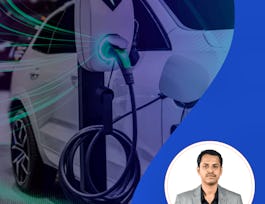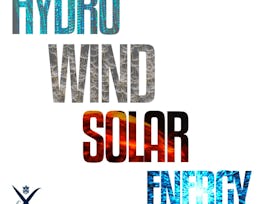Understanding renewable energy technologies is important, but equally important is knowing how to effectively deploy these technologies to provide renewable energy to end-users – the topic of this course. Upon completion of the course, you will understand the development and management of renewable energy projects, large and small, from conception to launch and subsequent operation.



Renewable Energy Projects
This course is part of Renewable Energy Specialization

Instructor: Stephen R. Lawrence
Sponsored by Louisiana Workforce Commission
9,886 already enrolled
(140 reviews)
Recommended experience
What you'll learn
How to quickly assess the feasibility of a proposed renewable energy project.
How to plan and finance a renewable energy project.
How to execute the construction and ongoing operations of a renewable energy project.
Skills you'll gain
Details to know

Add to your LinkedIn profile
5 assignments
See how employees at top companies are mastering in-demand skills

Build your subject-matter expertise
- Learn new concepts from industry experts
- Gain a foundational understanding of a subject or tool
- Develop job-relevant skills with hands-on projects
- Earn a shareable career certificate


Earn a career certificate
Add this credential to your LinkedIn profile, resume, or CV
Share it on social media and in your performance review

There are 5 modules in this course
This first week’s module examines the important topics of renewable energy project planning and site selection. The first step in developing a renewable energy project is to undertake an initial high-level feasibility study based on project goals and objectives, resource availability, local conditions, and preliminary financial analysis. Based on the results of this analysis, a decision must be made to proceed with the project plan, modify the plan, or abandon the plan in favor of other opportunities (the go-no-go decision). If the decision is made to proceed with a project, the location and site of the project is decided based on anticipated energy resources, regulatory and economic environments, and stakeholder interests. With a positive feasibility report and a site selected, intensive development of a renewable energy project can proceed!
What's included
11 videos2 readings1 assignment1 discussion prompt
The module this week summarizes how we can thoroughly measure a renewable energy resource (solar, wind, hydro…) over time at a chosen project site and to develop energy generation forecasts. Next, we address the needed technologies, equipment, and infrastructure necessary to develop a renewable energy project. With this information, we will be prepared to undertake detailed financial analysis of the developing project in the next module!
What's included
12 videos2 readings1 assignment1 discussion prompt
In the module for this week, we survey the many ways that renewable energy projects are financed. First, we review basic financial concepts such as including the time value of money (TVM), future and present value, perpetuities and annuities, discount rates, discounted cash flow (DCF), net present value (NPV), and Internal Rate of Return (IRR). We then use these concepts to create project financial profit, loss, and cash flow projections. We conclude with a review of the various ways that renewable energy projects are financed and how renewable energy projects are organized depending on their financial structure. Since (in)appropriate financing can make or break a project, a good understanding of project financing is imperative for renewable energy project developers!
What's included
17 videos2 readings1 assignment1 discussion prompt
After extensive project data gathering and planning, it is finally time to execute our plan, to construct our renewable energy plant, and to generate renewable energy! Getting to this point has been a long process, but recall that “a failure to plan is planning to fail.” In this module, we describe the steps required to construct a renewable energy plant; commission it to ensure it is operating properly; and then to operate and maintain the plant over its intended lifespan. Finally, at the end of its life, we will need to determine if the plant can be economically “repowered,” or if it should be decommissioned and torn down.
What's included
13 videos2 readings1 assignment1 discussion prompt
The last week of Renewable Energy Projects includes a final exam that will allow you to demonstrate your mastery of the content covered in this course. Take some time to study, review any concepts or topics you found challenging, and then take the final exam!
What's included
1 assignment
Instructor

Offered by
Why people choose Coursera for their career




Learner reviews
140 reviews
- 5 stars
82.26%
- 4 stars
15.60%
- 3 stars
0.70%
- 2 stars
0.70%
- 1 star
0.70%
Showing 3 of 140
Reviewed on May 30, 2022
The material provided in this course is really good.
Reviewed on Oct 10, 2023
Excellent course, with updated and applicable information
Reviewed on Jul 28, 2024
the accent of the speaker is unclear also he was just reading the slides their was no explanation
Recommended if you're interested in Physical Science and Engineering

Coursera Instructor Network

University of Copenhagen

École Polytechnique

Open new doors with Coursera Plus
Unlimited access to 10,000+ world-class courses, hands-on projects, and job-ready certificate programs - all included in your subscription
Advance your career with an online degree
Earn a degree from world-class universities - 100% online
Join over 3,400 global companies that choose Coursera for Business
Upskill your employees to excel in the digital economy



